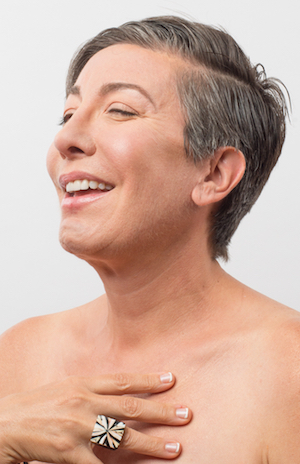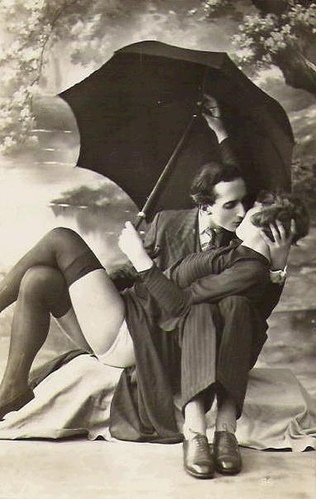“There is no shame in being a sexual person. Sex is what got us here; sex is how we are made. Our  species needs to dance and to shimmy and to hum and to flirt and to fuck. The sexy fuels health, beauty, music, joy, creativity, inspiration, and curiosity — who’d want to live without those things? Every single person alive on this earth today is a product of the erotic.”
species needs to dance and to shimmy and to hum and to flirt and to fuck. The sexy fuels health, beauty, music, joy, creativity, inspiration, and curiosity — who’d want to live without those things? Every single person alive on this earth today is a product of the erotic.”
-Lola Davina
Lola has spent more than twenty-five years in and around the sex industry, working as a stripper, dominatrix, porn actress, and escort over a fifteen-year period. She earned her M.A. in Human Sexuality, her M.S. in Nonprofit Fundraising, and she writes a self-care and wellness column for YNOTcam.com. I am honored to have the opportunity to discuss with her some of the intricacies of staying emotionally and physically healthy while working so intimately with sexuality.
You’ve pointed out that sex work is a career centered around the experience of passion, something that many of us are told to seek. Yet, collectively we struggle with understanding and respecting sex work. What do you think contributes to this dissonance for so many people?
I love this question, because, in my opinion, it gets to the heart of the stigma in sex work. Collectively, we are taught from a very young age that sex is many things: monumental, dangerous, taboo. We learn that it should unfold in a certain way, and must only take place between certain people, and to be acceptable, love and commitment need to be part of the mix. If for some reason these rules are not followed, terrible and damaging things can happen.
Sex work queers every element of that worldview: sex becomes functional, rather than sacred. Not in service of relationship or family-building, but purely for gratification. Paid sexuality often involves non-procreative behaviors: masturbation, outercourse, talking dirty, exhibitionism, kink. Sex workers, like firewalkers, step into that forbidden space, and make it their playground. As if all of that weren’t bad enough, sex workers perform these services for money, making us the queerest of the queer. Because if there is one thing that sets sex work apart, that makes it uncanny, is that people are performing sexuality on demand.
I use the word “uncanny” specifically, because I do believe that much of the stigma that stems from sex work is the belief that paid sexuality is fake, hollow, unreal. So, there must be something wrong with you if you seek it out; there must be something even more wrong with you if you provide it. Sexuality can be so overpowering—intoxicating us, filling our minds with taboo images, causing us to do strange and unfamiliar things. Someone who can conjure those forces, and yet not get swept up by them must seem a little spooky, a little unsettling.
I don’t have research to back this up, but I do believe that unease, that dis-taste is spontaneous and genuine, a kneejerk reaction that many outside the sex industry experience looking in. The antidote, much like any other phobia, is gradual familiarization and normalization, easing into an understanding that sex workers need not be depraved or sex-crazed or altogether dead inside. They can experience a wide spectrum of physical and emotional pleasure from their work, along with negative experiences, within a manageable range. Simply contemplating the possibility that sex work might not be the right choice for oneself, but can be a viable profession for someone else is a step in the right direction.
I see great overlap between the self-care approaches you recommend for sex workers, and healthy self-care for anyone. Are there very many differences that you see?
I can’t speak to any kind of universal experience of performing sex work, but I can say that what I felt, and many other sex workers tell me about, is that sex work is a heightened experience. It’s taboo-smashing, it’s transgressive, often exciting, even exhilarating. But it can also be terrifying, demeaning, disorienting. We face rejection at every turn. Additionally, when you turn people on for a living, emotional shit is bound to come up, both for you and your clients. As I never get tired of saying, sex work is serious emotional labor, and self-care is essential.
Certainly, self-care is important for non-sex workers as well, and I would like to see more awareness about the emotions that sex can stir up. The Latin phrase “Omne animal post coitum triste” springs to mind: “All animals are sad after sex.” All kinds of reactions can surface during and after, including loneliness, an aching need for connection or affirmation or devotion or for never-ending communion, a desire to feel desirable, to feel safe or thrillingly endangered, to cross forbidden lines. We don’t do a very good job of conceptualizing sexual aftercare in our culture. Basically, our toolkit consists of: have sex with a romantically appropriate partner, make sure everyone is satisfied (somehow—this part might be a little fuzzy), and anything you feel after the fact is going to be awesome! Perhaps my sarcastic tone makes it clear that I don’t believe that is always the case
My advice throughout “Thriving” is simple: we have to feel what we feel. Listen to what those emotions are telling us, no matter how unpleasant or overpowering they may be in the moment. Honing those skills—to be present and honest, to know deep down in our guts that we can endure temporary emotional pain and let it pass through us—this is big magic, once we’ve been at it awhile. It gives us the resiliency and compassion needed to meet others where they are at, which is a powerful gift to the world, for sex workers and non-sex workers alike.
Are there any mistakes you believe you’ve made as a sex worker?
I had to laugh when I read this question, because if I have one regret in writing “Thriving in Sex Work,” it’s that I didn’t come clean that the entire book serves as a litany of my mistakes as a sex worker. Turn to any page, and whatever advice I offer, there’s a backstory of a time—or many, many times—when I screwed up. By this I mean letting myself down, beating myself up, allowing myself become subsumed by anger or self-loathing or dread.
To any of my readers reading this now, here’s my confession: I didn’t write “Thriving” to brag about what a boss lady I was. I wrote it because looking back, almost every day there were ways I could have been gentler, wiser, kinder with myself. No question, I could’ve been better with money, more assertive with clients, less insecure romantically. I could have sought out professional help, rather than believing I had to do everything alone
I write in “Thriving” about how punishing failure can feel in sex work, that “only by appearing to be perfect can we combat negative stereotypes. So it may feel unsafe to admit that we’re struggling with the job, for the fear it makes us look like losers. If we have a bad call, or fall in love with a client, or feel overwhelmed, didn’t we bring it on ourselves? Vulnerability can result in a reflexive need for privacy, not wanting to put up a hard, sassy shield many of us don’t authentically feel and that can be exhausting to perform.” I believe that fear of exposure—not as a slut, but as a screw-up—is one of the main reasons sex workers remain in the closet. It can also mean that even our closest working confidants don’t feel safe to fully confide in, for fear of being judged.
In talking about that vulnerability, my message is: Coming out as sex workers, just as we need to feel safe to be visible, we need to feel safe to be vulnerable. There has to be room to acknowledge our demons, our doubts, our damage. Most of us muddle through sex work making all kinds of mistakes along the way. It should be okay to say so.
She leaves you wanting to know more, doesn’t she? I actually bombarded her with seven more questions! I encourage you to follow that interest, and find out more about Lola and the incredible work she does here.

